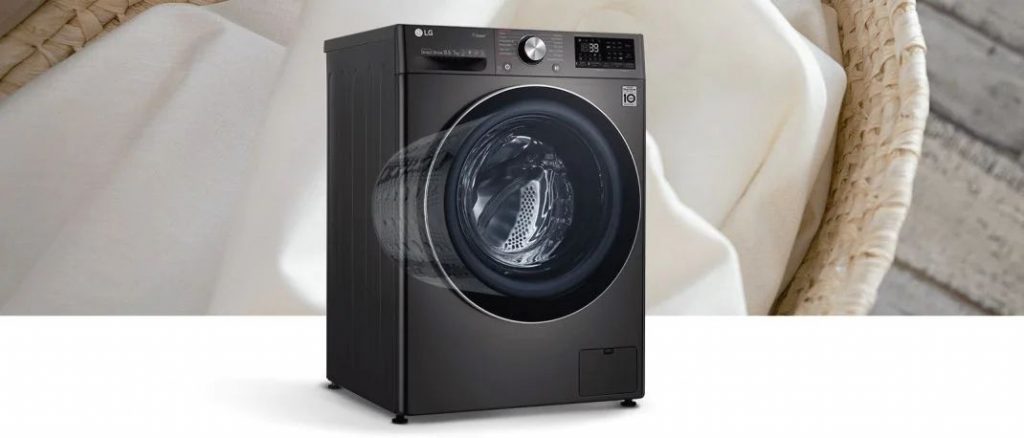Inverter washing machines have become quite popular nowadays. If you are searching for a new washing machine, you may receive many recommendations for this type of washing machine. But, what does inverter mean on washing machine?
“Inverter” stands for the type of improved technology related to the machine’s performance. So, it is not something visible outside or a new way of washing. Inverter machines look identical to conventional washing machines.
Here is a complete explanation of the inverter technology and why it occurs in everyone’s home.

What Does Inverter Mean on Washing Machine?
Washing machines with inverter technology have sensors that measure the laundry’s weight and determine the performance speed by the measured weight.
Inverter machines find the most optimal motor speed instead of making drastic speed changes. They might decrease electricity bills by 20% compared to regular machines.
Moreover, inverter washing machines are more durable, efficient, and silent. The motor of inverter machines lacks moving parts like belts and gears. Instead, it has digital sensors that manage the optimum speed by the load weight.
The lack of moving parts makes inverter washing machines silent and less vibrating. Plus, digital technology lets you control the washing machine using your phone.
Most new inverter washing machine models have a built-in WiFi feature and easily connect to a mobile device. Also, the fewer moving parts inside the motor make these washing machines more durable.
Moreover, you would not need to replace the moving parts that often break because of the aggressive movements. Generally, most inverter washers have up to 10 years of warranty on the motor.
Inverter vs. Conventional Washing Machines
From the outside, both inverter and conventional washing machines look the same. The main thing you can notice with your senses is how they work and the noise they produce.
The biggest difference is inside the machine’s motor. This difference is charged for the efficiency, vibrations, and many other things I’ll elaborate on below.
Motor
Conventional washing machine
The conventional washing machine motor is constructed with many moving parts. The thing that makes the motor move and work are the belts, gears, and pulleys.
When the machine runs the cycle, the moving parts start controlling the drum movements and practice the same moves regardless of the load.
In other words, a conventional washing machine will use the same electricity amount whether the machine is full to max or has just a couple of garments.
Inverter washing machine
Inverter washing machines replace all moving parts with lasers and sensors. When the machine is loaded, the sensors measure the load’s weight.
The sensors predict the speed and energy needed to perform the cycle based on the load weight measures. This makes inverter washers more efficient.
Read more: How Powerful Is A Washing Machine Motor?
Lifespan
Conventional washing machine
Since conventional washing machines have mechanical motor construction, their lifespan is shorter. The rough movements often damage the tiny moving parts, and they need to be replaced more frequently.
Inverter washing machine
The digital technology of inverter washers has fewer moving parts and rough movements.
The lasers and sensors adjust the performance speed and make the machine last much longer. These machines may come with up to a 10-year warranty on the motor.
Efficiency
Conventional washing machine
Conventional washers use a lot of electricity. The load amount and weight does not affect the power consumption.
Inverter washing machine
The sensors built into the inverter motor measure the load and determine the power consumption. Inverter machines use renewable energy, which is why they are more efficient.
Noise
Conventional washing machine
The moving parts and uncontrolled speed make these machines moving and noisy.
Inverter washing machine
Inverters have much better balance and performance, making the cycles silent and less vibrating.
Price
Conventional washing machine
Conventional washing machines have older technology, which is logical to have a more affordable price.
Inverter washing machine
Inverter washing machines have the latest technology that makes these machines much better than conventional ones. You may pay a few hundred more, but you will also save more on the electricity bill.
By the calculations, choosing an inverter washing machine might be a much better option because you invest in something that will use renewable energy and might decrease the electricity bills by 20%.
Also read: How Does A Washing Machine Water Level Sensor Work
Conclusion
So, what does inverter mean on washing machine? Well, I hope this article has provided an explanation about everything for inverter washing machines.
In my opinion, it is always worth investing in power-saving devices and appliances, especially ones that you use all the time.







